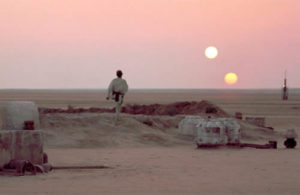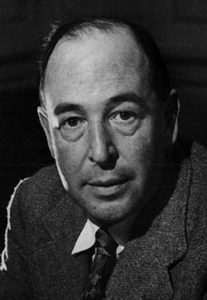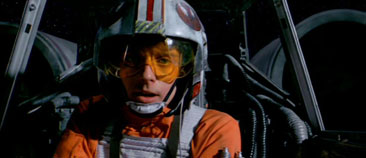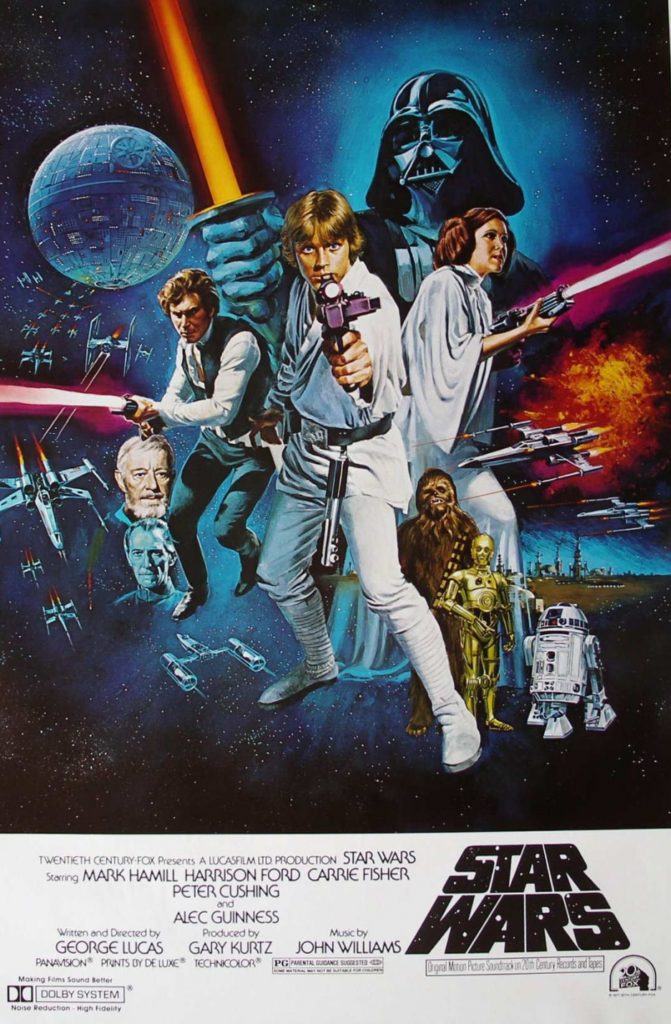SpecFaith Movie Missions: Star Wars

Explore SpecFaith Movie Missions for The Empire Strikes Back and Return of the Jedi.
Some months after the Disney purchase of the Star Wars franchise and announcement of new films, in summer 2013 I helped host a Star Wars original trilogy viewing at my church.
We viewed Star Wars, The Empire Strikes Back, and Return of the Jedi.1
Then we explored the films starting with a series of questions. For the first film, the questions tended to challenge lingering assumptions that Star Wars plays by science-fiction rules, not fantasy rules. It doesn’t. Jedi knights are wizards, The Force is magic, and the whole thing is quite religious — and often opposed to biblical Christianity.
Yet how can Christians explore, engage, and enjoy Star Wars anyway?
From the Speculative Faith Movie Missions series introduction, posted a long time ago in a galaxy far away:
Why then should Christians enjoy stories and movies?
Based on the same reason God created man to do anything, as the confession says:
Man’s chief end is to glorify God, and to enjoy Him forever.
… We might reword the definition to be about art, stories, movies, or any Thing:
Story’s chief end is to help us glorify God, and to enjoy Him forever.
We might flesh this out: With a story we can explore and enjoy the beauty, goodness, and truth of God, people, and His world.
In a context of biblical discernment and caution about our own temptations, we can engage with Star Wars to explore and enjoy the beauty, goodness, and truth of God, people, and His world.

- What sort of story is this? How does that affect how we discern and enjoy it?
- Dramatic opening: hear. Imagine you’ve never seen this film before. What does what we hear “say” about the story and how we may react, before we have seen anything?
- Dramatic opening: see. After the scrolling opening prologue, we see the giant ship on top, firing laser blasts at the tiny ship at the bottom. What does this tell us about the story and likely which ship the storytellers expect us to “root” for? (Hint, and related: And how do many other stories also emphasize rooting for the “underdog” rebel side?)
- Dark Vader. Before we meet the hero, we meet the film’s primary villain. Without any reference to later films, what do we think of Darth Vader? He is masked and in black; Leia shows her face and wears white. What is this meant to show to the story’s viewers?
- Delayed hero. Though we see Princess Leia early on, at first the film almost acts as if C3P0 and R2-D2 as the protagonists. Only later do we catch up with Luke Skywalker and Han Solo. (Behind-the-scenes information reveals that scenes were shot showing more of Luke’s life, including him hanging out with his friends, but those scenes were cut.) Of these three heroes, who do we most root for? How are the others different?
- “That wizard is just a crazy old man.” Uncle Owen says this about Obi-Wan Kenobi. “Crazy old man,” clearly not. (The story makes us wonder.) But what about “wizard”?
 Enter The Force. Obi-Wan informs Luke, “The Force is what gives a Jedi his power. It’s an energy field created by all living things. It surrounds us and penetrates us. It binds the galaxy together.” What do you think about The Force concept? What may be true about it? What may be wrong about it, but not harmful? What can be harmful about it?
Enter The Force. Obi-Wan informs Luke, “The Force is what gives a Jedi his power. It’s an energy field created by all living things. It surrounds us and penetrates us. It binds the galaxy together.” What do you think about The Force concept? What may be true about it? What may be wrong about it, but not harmful? What can be harmful about it?- “The ways of the Force.” When Luke has nothing left, he has a “conversion.” He says, “I want to learn the ways of the Force and become a Jedi like my father.” Any thoughts?
-

He commented on “Star Wars” before it was cool.
“Only a blind force.” C.S. Lewis in Mere Christianity writes:
“When you are feeling fit and the sun is shining and you do not want to believe that the whole universe is a mere mechanical dance of atoms, it is nice to be able to think of this great mysterious Force rolling on through the centuries and carrying you on its crest. If, on the other hand, you want to do something rather shabby, the Life-Force, being only a blind force, with no morals and no mind, will never interfere with you like that troublesome God we learned about when we were children. The Life-Force is a sort of tame God. You can switch it on when you want, but it will not bother you. All the thrills of religion and none of the cost. Is the Life-Force the greatest achievement of wishful thinking the world has yet seen?
What do you think?
- “Religion’s greatest hits.” That’s what Mark Hamill (Luke Skywalker) called The Force concept. Is he right? The Similarly, TVTropes.com calls this an example of an “interfaith smoothie.” How should we be aware of these, and do they post a risk to all Christians?
- Good parts version. Though the Force is based on Eastern belief, do its believers have the moral relativism of Eastern religions? How do good and evil appear in the story?
- Brute force (lowercase-F). But then all the mystical stuff is gone during the Death Star sequence. What do you love about these scenes? Which capabilities and actions do the heroes show ? (Example: Han’s approach versus Luke’s approach, and their differences with Leia.) How does all this hold our interest, and not just the threat of the villains?
 “… I knew you were going to say that.” As the Millennium Falcon is being pulled into the Death Star, Han Solo says what most people consider to be a bad word (when it’s used not to mean God’s eternal punishment). Obi-Wan said the same word earlier. This surprised me, mainly because I don’t recall these words appearing in other Star Wars films and they seem to be particularly modern slang. What do you think about this?
“… I knew you were going to say that.” As the Millennium Falcon is being pulled into the Death Star, Han Solo says what most people consider to be a bad word (when it’s used not to mean God’s eternal punishment). Obi-Wan said the same word earlier. This surprised me, mainly because I don’t recall these words appearing in other Star Wars films and they seem to be particularly modern slang. What do you think about this?- Simple story. A brief exception to the “no other Star Wars movie discussion” standard: Many other films that are trying to follow in Star Wars’s course feature complex plots and special effects. Are they more exciting, less than, or about the same as this? Why?
- “Quite the mercenary.” What are the main differences between Luke and Han Solo?
- Final duel. Darth Vader defeats Obi-Wan Kenobi — or does he? Without knowing what comes next, what does Obi-Wan do? Does it change the story’s outcome, or is his choice more mysterious? Might we say this counts as a heroic sacrificial death to save others?
- Rebels strike back. Luke and his friends regroup at the rebel base to plan an assault on the Death Star. Without hearing much of the “politics” behind the Rebels vs. Empire, what do we see that gives us just enough context? On what does the story focus instead?
- “May the Force be with you.” Though Han declares he’s selfishly leaving this battle, he utters this religious phrase to Luke — and seems to mean it. Do you believe he did?
 Last battle. Until Star Wars released in 1977, audiences had not seen a space battle of this magnitude or with these kinds of effects. Even more than 35 years later, how does this battle captivate us and make us root for one side? What makes the bad guys bad?
Last battle. Until Star Wars released in 1977, audiences had not seen a space battle of this magnitude or with these kinds of effects. Even more than 35 years later, how does this battle captivate us and make us root for one side? What makes the bad guys bad?- “Let go, Luke.” Obi-Wan makes good on his pledge to become “more powerful” in some way by somehow urging Luke to forego his targeting system and fly using his feelings, or instincts, or whatever it is — what do you think Luke used instead? Might there be any Biblical truth this scene echoes? Is there any risk if we tried to imitate this action?
Explore SpecFaith Movie Missions for The Empire Strikes Back and Return of the Jedi.
- Or if you prefer, Episodes IV, V, and VI. ↩






























It is not created by all living things, but by Life Himself. But all things that exist are united in their relationship to the common existence. I’m being really idiotic and pretentious with this sloppy sophistry, but it’s how I think. I think God is both the common existence from which all things are derived, and the great Theme that gives all things meaning, so in a sense He flows through everything. One dangerous thing about the romanticized “life force” concept is its cheap, obviously false sentimentality.
A few years ago, I might have seen this point in the movie or some other arbitrary “threshold crossing” point as a parallel to becoming a born-again believer. But I no longer think that way. It’s merely a “threshold movement” in a monomythic sense, or even more simply in a plot-development sense. (Though, one teacher I had thought the Cantina was the real threshold seen.)
Are all thresholds types of Christian conversion? Is there something inherently parallel to the concept of receiving Christ as Savior? No, I think. Because the conversion experience is not universal, and at any rate if we’re going to be interpreting the mythological/plot archetypes in a specifically Christian way we should use Christ’s life as the deeper meaning, rather than our own confused and contradictory experiences.
(Of the C.S. Lewis quote.) Somewhat relevant to the worldview in Star Wars, but not especially so. I think a non-dualistic Life Force fits Lewis’s criticism better—the concept that it’s natural for the strong to prey on the weak, because that’s how the life cycle works.
It is an “interfaith smoothie” — but I don’t even think the interfaith aspect is really where the bad theology comes from. The “Life Force” can invade bad gnostic Christianity too. Practically everything meaningful in sci-fi is an “interfaith smoothy,” and some of them are very spot-on with the human condition, even more than Star Wars is.
Arbitrary, but not relative. I think the truth is the opposite. I think morality is sometimes relative to varying degrees (relative to the one Absolute), but never arbitrary. I don’t know much about Eastern religions, but this purported relativity is a non-issue. I’m a socially conservative Christian and I’m more relativistic.
Idealism versus cynicism. In this, they make a compelling pair of opposites. I feel these two conflicting forces in myself all the time.
Despite the fact that Lucas followed the monomyth template so closely, Obi’s death really did feel surprising, even still does to me. I don’t know if it’s a properly sacrificial death, but it is a fascinating moment.
Yeah, this is probably sketchier than the whole Force thing. I think many of us know the experience of being burned by this kind of spiritual platitude, or of wrongly using it to justify being blunt and lazy. But of course there is a ring of truth in it that we shouldn’t overlook.
Thanks for doing one of these!